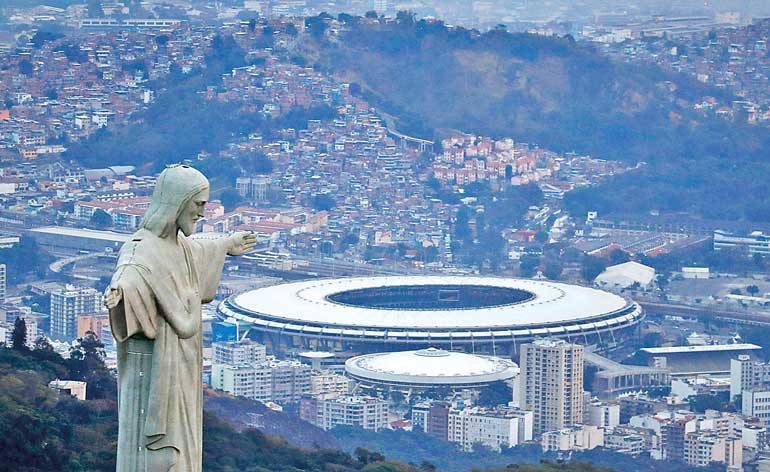Wednesday Feb 18, 2026
Wednesday Feb 18, 2026
Friday, 5 August 2016 00:00 - - {{hitsCtrl.values.hits}}
 An aerial view shows the Christ the Redeemer statue with the Maracana stadium in background, in Rio de Janeiro, Brazil - REUTERS
An aerial view shows the Christ the Redeemer statue with the Maracana stadium in background, in Rio de Janeiro, Brazil - REUTERS
Rio de Janeiro (CNN): The women’s football competition in the Rio 2016 Summer Olympic Games may have already started, but the one event that’s on everyone’s mind this week is the opening ceremony at the iconic Maracana Stadium, expected to be seen by three billion people around the world on Friday.
The Local Organising Committee for Rio 2016 promises this will be one unforgettable night of Brazilian music and dance, including a 12-year-old rapper, two of Brazil’s most famous singers, Gilberto Gil and Caetano Veloso; and lots of samba.
Dancers from 12 samba schools in Rio will make their way through the Maracana before the night is over and the athletes march.
“I hope that the opening ceremony will be a drug for depression in Brazil. Brazilians can look at it and say, ‘We are a cool people, we are different ethnic groups, we live together, we never went to war, we are peaceful, we know how to enjoy life and we tend to be happy,’” said Fernando Meirelles, one of the three creative directors for the ceremony.
Meirelles is a Brazilian filmmaker known for his Oscar-nominated movie “City of God,” an account of life in Rio de Janeiro’s favelas. Meirelles follows in the footsteps of fellow film director, Danny Boyle, the cinematic mind behind the London 2012 Olympic Games Opening Ceremony.
During the ceremony, supermodel Gisele Bündchen will play the part of the famous “girl from Ipanema” while Brazilian model Lea T will become the first transgender person to have a major role at an Olympic opening ceremony.
Although massive in scale, this Olympic’s ceremonies will be on a very tight budget. Brazil is going through its worst recession in recent history, and that has impacted the show.
“We were looking at a budget of $113.9 million for the four ceremonies -- opening and closing ceremonies for the Olympic and Paralympic Games,” Meirelles said in a statement released by the local organizing committee.
“But now our budget is $55.9 million for four ceremonies. Most of this money is for security, and all the stuff around the show. I think it is 12 times less than London, 20 times less than Beijing. This makes it very challenging. “I have never done anything on this scale, and will never do so again in my life,” he added. “Everything is very big, the stage is very big. It’s a huge responsibility.”
Meirelles isn’t the only one under pressure. Deborah Colker, Brazil’s most celebrated choreographer, has been working countless hours to manage the more than 6,000 volunteers who will dance in the opening ceremony. Colker and the volunteers have been rehearsing since May at a secret outdoor venue near the Maracana.
Perhaps the most traditional part of the opening ceremony is the parade of athletes. American Steve Boyd has the task of organising the 550 volunteers who will help him parade 12,000 athletes and delegation members, the longest part of the complex show.
Organisers for the opening ceremony have also kept a tight lid on who will light the Olympic cauldron, and how the flame will be carried from the Maracana to the Olympic Boulevard, a newly built area near the Rio de Janeiro port.
Brazilian football king Pele told Brazilian media that he was asked to light the cauldron, but has not yet accepted the IOC’s invitation.
While he’s very happy to have had the opportunity to work on such an event, Meirelles said he’s also looking forward to it being done. “I am looking forward to getting back to my life. If I knew what was going to happen, would I accept to do it (in the first place)? I am not sure.”